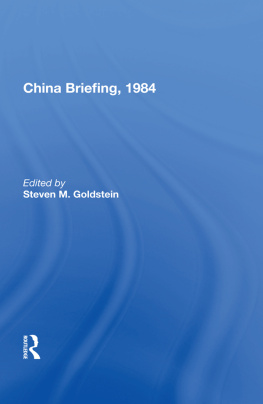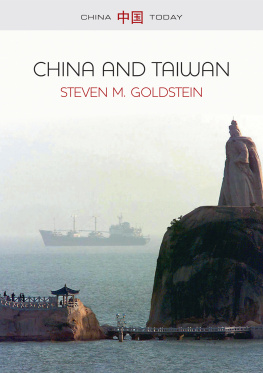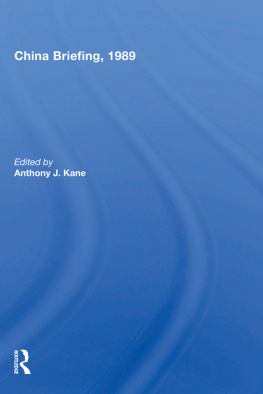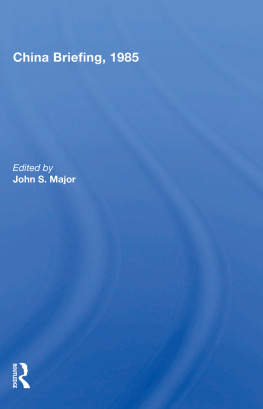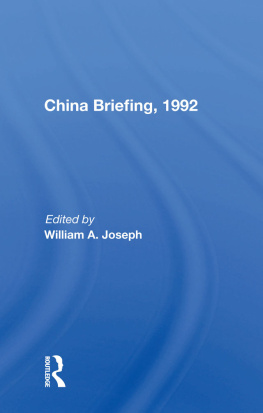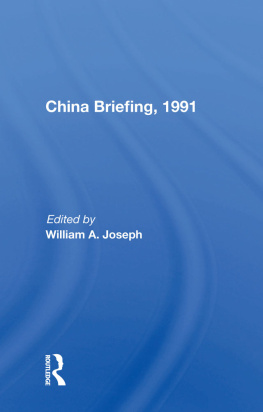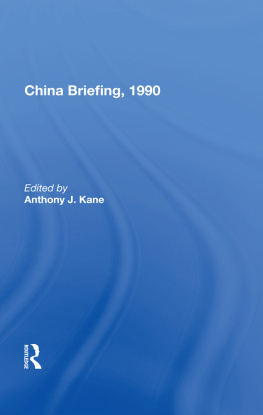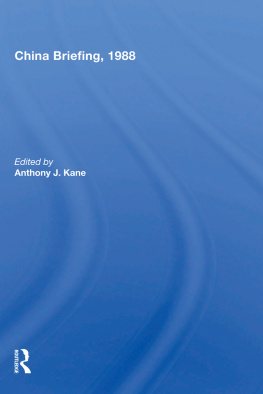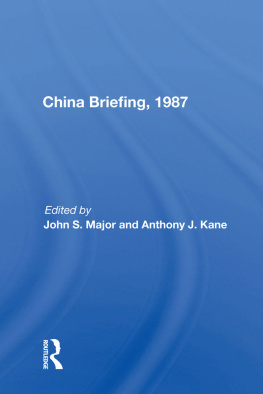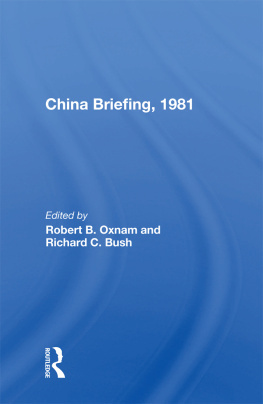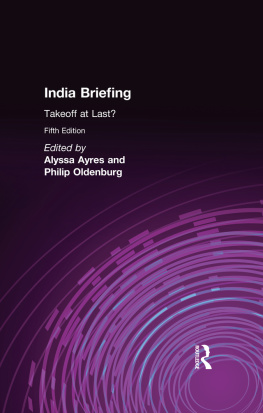Also of Interest
China Briefing, 1982 , edited by Richard C. Bush
China Briefing, 1981 , edited by Robert B. Oxnam and Richard C. Bush
China Briefing, 1980 , edited by Robert B. Oxnam and Richard C. Bush
China and the World: Chinese Foreign Policy in the Post-Mao Era , edited by Samuel S. Kim
China s Cultural Heritage: The Ching Dynasty, 16441912, Richard Smith
China Through the Ages , Franz Michael
The Government and Politics of the PRC: A Time of Transition , Jrgen Domes
The Making of Foreign Policy in China: Structure and Process , A. Doak Barnett
China Geographer: No. 12: The Environment , edited by Clifton W. Pannell and Christopher L. Salter
Power and Policy in the PRC , edited by Yu-ming Shaw
Available in hardcover and paperback.
First published 1985 by Westview Press
Published 2018 by Routledge
52 Vanderbilt Avenue, New York, NY 10017
2 Park Square, Milton Park, Abingdon, Oxon OX14 4RN
Routledge is an imprint of the Taylor & Francis Group, an informa business
Copyright 1985 by The Asia Society, Inc.
All rights reserved. No part of this book may be reprinted or reproduced or utilised in any form or by any electronic, mechanical, or other means, now known or hereafter invented, including photocopying and recording, or in any information storage or retrieval system, without permission in writing from the publishers.
Notice:
Product or corporate names may be trademarks or registered trademarks, and are used only for identification and explanation without intent to infringe.
Library of Congress ISSN: 0740-8005
ISBN: 0-8133-0222-6
0-8133-0223-4 (pbk.)
ISBN 13: 978-0-367-00629-7 (hbk)
For N.L. G.
Contents
THOMAS P. BERNSTEIN
MERLE GOLDMAN
MARTIN KING WHYTE
STEVEN M. GOLDSTEIN
DOROTHY J. SOLINGER
CHRISTINE WONG
The China Council of the Asia Society was founded in 1975. Its purpose is to increase American understanding of Chinese life, culture, and society; to counter stereotypical thinking about China; and to provide a non-partisan source of information for those seeking to understand or explain China to the American public.
In line with these goals, the China Council has, since 1980, published an annual China Briefing. Past volumes collected briefing papers on various aspects of Chinese life written for the Council during the course of the previous year. The purpose of the book was to provide a convenient and timely summary of the years developments in China.
This year I have changed the format. The goal of the volume remains the same. However, when planning the 1984 edition, I felt that these goals would be better served by commissioning papers on specific aspects of Chinese life to be written immediately after the conclusion of the year.
The speed with which this volume appears is due to the hard work of many individuals. First of all, credit must go to the contributors, who worked very quickly under a tight deadline. Solingers thanks go to Barry Naughton for reading her paper and mine go to Harry Harding for his reading and constant support. Thanks must also go to the typists, Sharon Flannery and Meera Kothari. Pamela White was an absolutely superb editor, who quickly achieved a mastery of China in 1984. Finally, Deborah Lynes, Jody Shulins, and Kathy Streckfus at Westview provided much welcome assistance and support.
This project began during my tenure as director of the China Council and was finished upon my return to Smith College. It is only fitting that I thank my many friends at The Asia Society who made my stint there an enjoyable and challenging one; in particular the China Council team, Kate Sears and Tzu-lin Li.
Steven M. Goldstein
Northampton, Massachusetts
March 1985
Source: U.S. Department of State, Background Notes: China, December 1983.
1
Domestic Politics
Thomas P. Bernstein
In 1984 reform dominated the news. Scarcely a day passed when the press didnt discuss this or that aspect of economic reform, institutional reform, or reform of the personnel system. Major new changes were announced, ranging from Document #1 in agriculture, which extended household contracting to fifteen years or more, to the opening of fourteen cities to foreign investment, which expanded the concept of the special economic zones, to the decision in October to embark on comprehensive urban-industrial reform. These announcements were impressive evidence of the capacity of the reform group led by Deng Xiaoping to shape the political agenda and to further the enterprise begun six years earlier at the Third Plenum of the 11th Central Committee in December 1978. They attested to the domination of the political process by the Deng group and to the groups capacity to defuse opposition. Indeed, it is probably fair to say that economic successes attained in recent years, most spectacularly in agriculture, have given the reforms a momentum which not only makes them very hard to stop but which reduces the possibility of an effective political challenge. Chinas reformers seem increasingly gripped by the exciting vision that after nearly a century and a half of floundering, the country is at last on the road to rapid modernization. If the economy continues to move forward at a rapid pace, thereby vindicating the reformers policies, opponents will have a hard time arguing with success.
This is not to imply that 1984 was free from political conflict, only that opponents of the reform measures lacked the power to impose a change of direction. Opponents include Maoist whateverists, now very weak at the top of the power structure but still present to greater or lesser degrees within the bureaucracies, The pattern of political conflict was shaped by a campaign against spiritual pollution that began in October 1983 and caused a reaction of such magnitude that the reform process, instead of being arrested as intended, was further accelerated.
The Spiritual Pollution Campaign and Its Consequences. Surprisingly, it was Deng Xiaoping who in October 1983 called for forceful criticism of spiritual pollution, combined with necessary restraining measures. Spiritual pollution refers to deviations that range from advocacy of Marxist humanism and the idea that alienation exists in socialist society to acceptance of Western concepts of social science and liberal tendencies in art and literature. In society, it refers to unhealthy tendencies such as interest in rock music, vulgar books, pornography, Western fashions, and other aspects of cultural contamination.
Why would Deng, the leader of the reform forces, call for criticism of spiritual pollution? One explanation is that Deng is not a liberal. He is a Marxist-Leninist who has little tolerance for bourgeois liberalization. Deng led the harshly repressive anti-rightist campaign of 1957, and defended his conduct in his 1983 Selected Works, though acknowledging that the drive had gone too far.
Another explanation, however, is tactical. Deng may have launched the drive in order to preempt demands for a much more rigorous antirightist crackdown. Whatever Dengs motives, it seems clear that he did not want a harsh campaign, one that might endanger important reform objectives by, for instance, frightening Chinas intellectuals or closing the Open Door. As Hu Qili, a rapidly rising reform leader, put it July 1984: When Comrade Xiaoping put forth the issue of opposing spiritual pollution, he clearly explained the scope and the policy concerned. However, when a terrific uproar was made, things happened beyond our expectations. As the pressures of the campaign began to make themselves felt, Chinese reportedly reduced their contact with foreigners, while foreign investors, especially Japanese, held back. Both Hu Yaobang, who visited Japan in November 1983, and Zhao Ziyang, while in the United States in January 1984, were queried about spiritual pollution. The campaign thus damaged Chinas international prestige and raised questions about Chinas reliability as a commercial partner.


